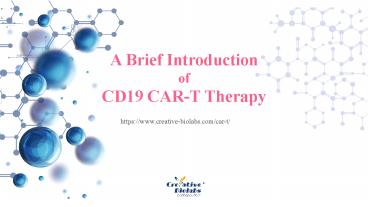A Brief Introduction of CD19 CAR-T Therapy - PowerPoint PPT Presentation
Title:
A Brief Introduction of CD19 CAR-T Therapy
Description:
The CD19 chimeric antigen receptors (CARs) are fusion proteins expressed on the surface of T cells by gene recombination technology, which combines a hinge region, a transmembrane domain, and one or more intracellular T cells that will specifically recognize the single-chain variable region and the extracellular domain of antibodies of CD19 by stimulating or co-stimulatory molecules. Learn more about CAR T at – PowerPoint PPT presentation
Number of Views:135
Title: A Brief Introduction of CD19 CAR-T Therapy
1
A Brief Introduction of CD19 CAR-T Therapy
https//www.creative-biolabs.com/car-t/
2
CD19
The CD19 chimeric antigen receptors (CARs) are
fusion proteins expressed on the surface of T
cells by gene recombination technology, which
combines a hinge region, a transmembrane domain,
and one or more intracellular T cells that will
specifically recognize the single-chain variable
region and the extracellular domain of antibodies
of CD19 by stimulating or co-stimulatory
molecules.
3
When the gene sequences constituting the CARs
molecule are transferred into T cells by genetic
modification, the expression of CD19 CARs in T
cells alters the specificity of the T cells to
directly act on the target cells expressing CD19.
Normally, CD19 CAR-T cells are delivered to
patients after chemotherapeutic treatment with
lymphocytic clearance in vivo, and the clinical
effect of CD19-positive tumor cell lysis occurs
when CAR-T cells are accumulated in large amounts
in vivo for 2-3 weeks
4
This treatment may cause the patient to develop
cytokine release syndrome (CRS). The main
clinical manifestations of CRS include fever,
hypotension, capillary exudation, coagulopathy,
organ failure, and neurotoxicity. The main cause
of CRS is the increase in serum cytokine
concentrations such as IL-6 and gamma interferon.
Cellular immunotherapy of CD19 CAR-T has shown
very promising results in relapsed B-cell acute
lymphoblastic leukemia and has also shown
encouraging results in the treatment of B-cell
non-Hodgkin lymphoma and chronic lymphocytic
leukemia.
5
Although CD19 CAR T immunotherapy is still
immature, many research centers have begun to
accumulate and report on the important experience
of CAR-T cells in the treatment of B-cell
malignancies related to production and effective
delivery of CAR-T cells. We hope to find out the
main influencing factors affecting the outcome of
CAR-T cell immunotherapy by comparing different
clinical trial data.
1
It should be noted that the production strategy
including the separation and stimulation of T
cells, the design of CAR structures, the
transduction of CAR T gene, and the composition
of cells and the number of amplifications to be
prepared for input into patients are all
different in different research centers.
2
6
Numerous preclinical studies of CAR-T cell
therapy have demonstrated that the design of CAR
T cell structure, the selection of single-chain
variable domains, the length and composition of
extracellular hinge regions, and the selection of
intracellular co-stimulatory molecular sequences
as a model system for CAR produce a very
important influence on the clinical effect of CAR
T.
Obviously, in addition to the production and
delivery of CAR-T cells, various factors such as
co-stimulatory molecules or inhibitory molecules
on the surface of tumor cells will affect their
therapeutic outcome, and thus the choice of
costimulatory molecules will be different in
different clinical contexts.
7
(No Transcript)
8
Contact us
45-1 Ramsey Road, Shirley, NY 11967, USA Email
marketing_at_creative-biolabs.com
9
Thank You
https//www.creative-biolabs.com/car-t/































